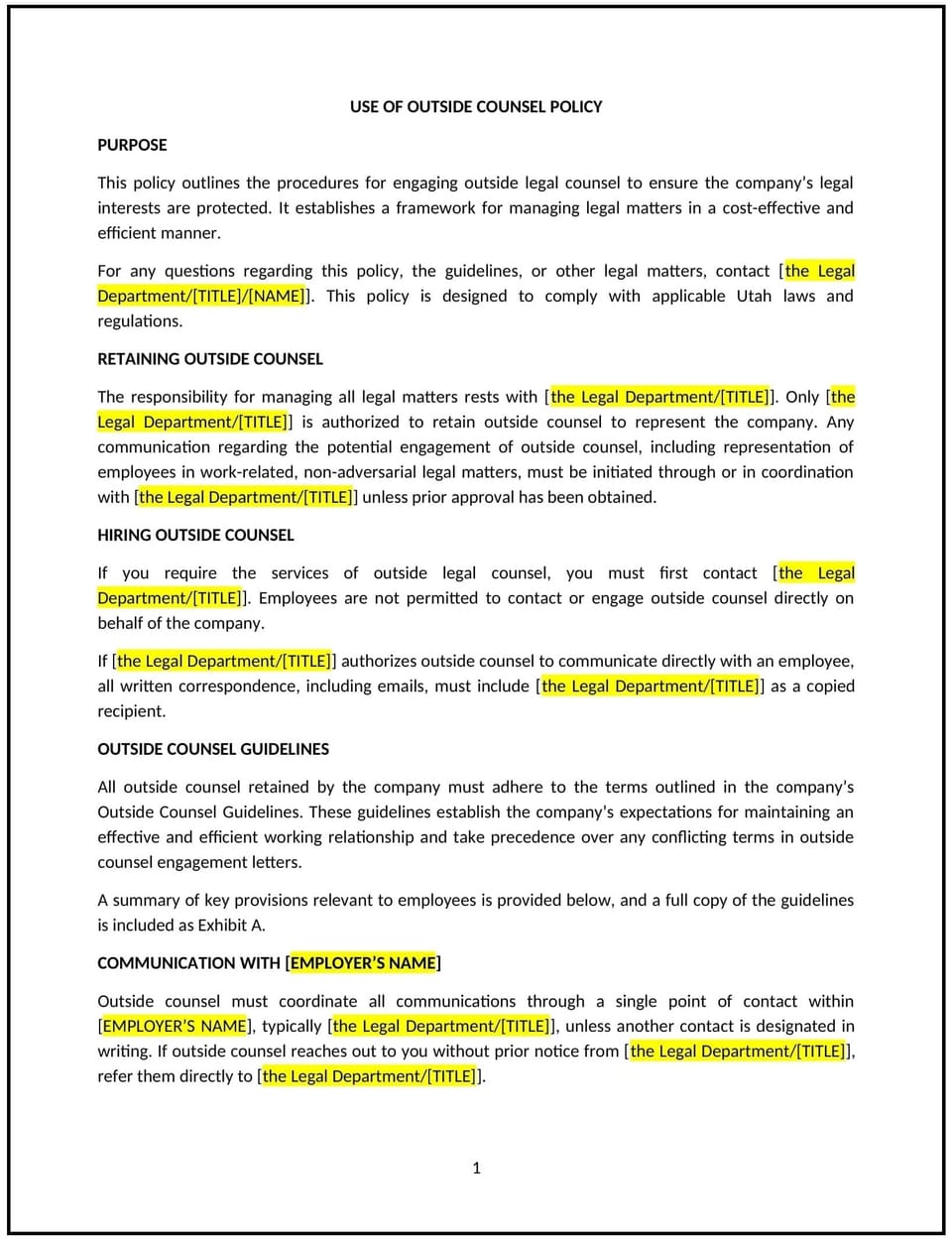Use of outside counsel policy (Utah): Free template

Use of outside counsel policy (Utah)
This use of outside counsel policy is designed to help Utah businesses establish guidelines for engaging external legal counsel. It outlines procedures for selecting, managing, and compensating outside counsel to ensure cost-effectiveness and alignment with business needs.
By adopting this policy, businesses can manage legal expenses, maintain quality legal representation, and align with general best practices for legal services.
How to use this use of outside counsel policy (Utah)
- Define outside counsel: Explain what constitutes outside counsel, such as law firms or independent attorneys.
- Establish selection criteria: Outline the process for selecting outside counsel, including qualifications, expertise, and cost considerations.
- Address engagement terms: Specify the terms and conditions for engaging outside counsel, including scope of work and billing arrangements.
- Monitor performance: Provide guidelines for evaluating outside counsel’s performance and adherence to engagement terms.
- Ensure compliance: Align the use of outside counsel with federal and state laws, such as attorney-client privilege and confidentiality requirements.
- Train employees: Educate employees on the policy and their responsibilities when working with outside counsel.
- Review and update: Assess the policy annually to ensure it aligns with evolving business needs and legal standards.
Benefits of using this use of outside counsel policy (Utah)
This policy offers several advantages for Utah businesses:
- Manages legal expenses: Ensures cost-effective use of outside counsel by setting clear engagement terms and billing arrangements.
- Maintains quality representation: Provides guidelines for selecting qualified and experienced outside counsel.
- Aligns with best practices: Offers a structured approach to managing external legal services.
- Reduces legal risks: Minimizes the potential for disputes or inefficiencies related to outside counsel.
- Enhances trust: Demonstrates a commitment to ethical and compliant legal practices.
Tips for using this use of outside counsel policy (Utah)
- Communicate the policy: Share the policy with employees and include it in the employee handbook.
- Provide training: Educate employees on the policy and their responsibilities when working with outside counsel.
- Monitor compliance: Regularly review outside counsel engagements to ensure adherence to the policy.
- Address issues promptly: Take corrective action if outside counsel violates engagement terms or fails to meet performance standards.
- Update regularly: Assess the policy annually to ensure it aligns with evolving business needs and legal standards.
Q: How does this policy benefit businesses?
A: By managing outside counsel effectively, businesses can control legal expenses, maintain quality representation, and reduce legal risks.
Q: What types of legal matters typically require outside counsel?
A: Matters may include litigation, regulatory compliance, mergers and acquisitions, or specialized legal advice.
Q: How can businesses ensure cost-effectiveness when using outside counsel?
A: Businesses should negotiate clear billing arrangements, set budgets, and monitor outside counsel’s performance.
Q: What should businesses do if outside counsel fails to meet expectations?
A: Businesses should address the issue promptly, terminate the engagement if necessary, and seek alternative legal representation.
Q: How often should businesses review this policy?
A: Businesses should review the policy annually or as needed to ensure it aligns with evolving business needs and legal standards.
This article contains general legal information and does not contain legal advice. Cobrief is not a law firm or a substitute for an attorney or law firm. The law is complex and changes often. For legal advice, please ask a lawyer.


